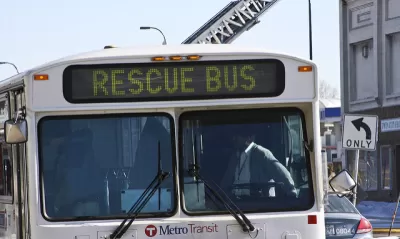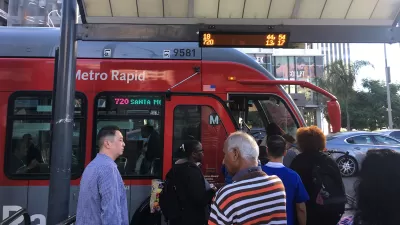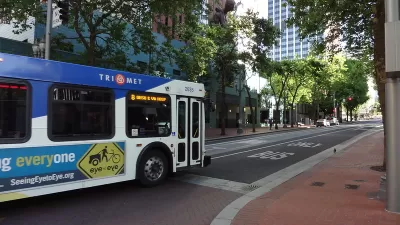While transit systems around the country had reason to celebrate the new funding made available in the federal infrastructure bill, long-term concerns about operational capacity have not been resolved.

"[The Detroit Department of Transportation] is making changes to routes across the city this week in an effort to improve service and reduce bus stop wait times," reports Eric D. Lawrence for Detroit Free Press.
C. Mikel Oglesby, Detroit's executive director of transit, is quoted in the article saying that the new schedules more accurately reflect the service currently provided, as the system "grapples with low ridership and a bus driver shortage." To minimize the inconvenience to riders, DDOT is targeting service reductions on low-ridership routes.
" [Oglesby] said DDOT is short about 90 drivers and ridership is down about 50%, from about 70,000 per day to 30,000-35,000 per day," reports Lawrence.
Bus driver shortages pre-date the pandemic—cities like St. Louis, Denver, and Minneapolis made news for cutting trips due to driver shortages in 2019, for example—but the problem has been perpetuated by the pandemic. MARTA also recently cut bus service in the Atlanta region, also citing bus driver shortages as the reason for the cutbacks.
In some respects, public transit seems to be prospering through the pandemic: Stimulus funding prevented the existential crises of Spring 2020, record amounts of new funding has been made available by the recently approved Infrastructure Investment and Jobs Act (IIJA), and a growing number of transit systems lowering or eliminating fares.
Despite those reasons for optimism, transit systems are still hanging by a thread (as reported on this site earlier in 2021): Ridership has been slow to return to most U.S. transit systems, the aforementioned driver shortages persist, and the IIJA also provided a record amount of funding for automobile infrastructure.
Most significantly to the future of public transit systems like the DDOT's, the structural deficit of transit funding for public transit operations in this country has not been resolved.
FULL STORY: DDOT to make route changes after low ridership, bus driver shortage

Alabama: Trump Terminates Settlements for Black Communities Harmed By Raw Sewage
Trump deemed the landmark civil rights agreement “illegal DEI and environmental justice policy.”

Planetizen Federal Action Tracker
A weekly monitor of how Trump’s orders and actions are impacting planners and planning in America.

The 120 Year Old Tiny Home Villages That Sheltered San Francisco’s Earthquake Refugees
More than a century ago, San Francisco mobilized to house thousands of residents displaced by the 1906 earthquake. Could their strategy offer a model for the present?

Oregon Legislature to Consider Transit Funding Laws
One proposal would increase the state’s payroll tax by .08% to fund transit agencies and expand service.

Housing Vouchers as a Key Piece of Houston’s Housing Strategy
The Houston Housing Authority supports 19,000 households through the housing voucher program.

Rural Population Grew Again in 2024
Americans continued to move to smaller towns and cities, resulting in a fourth straight year of growth in rural areas.
Urban Design for Planners 1: Software Tools
This six-course series explores essential urban design concepts using open source software and equips planners with the tools they need to participate fully in the urban design process.
Planning for Universal Design
Learn the tools for implementing Universal Design in planning regulations.
Clanton & Associates, Inc.
Jessamine County Fiscal Court
Institute for Housing and Urban Development Studies (IHS)
City of Grandview
Harvard GSD Executive Education
Toledo-Lucas County Plan Commissions
Salt Lake City
NYU Wagner Graduate School of Public Service




























